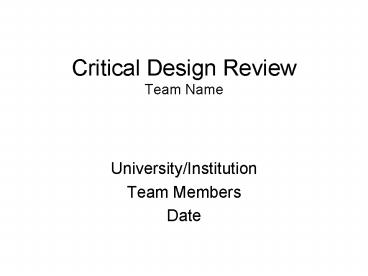Critical Design Review Team Name - PowerPoint PPT Presentation
1 / 22
Title:
Critical Design Review Team Name
Description:
What do you expect to prove, discover, or learn from your experiment? ... Li-Poly Battery 15V Unreg. Line 28V Line. Prim SA. Body SA. PCB. Mechanisms. EMC Hinges x4 ... – PowerPoint PPT presentation
Number of Views:28
Avg rating:3.0/5.0
Title: Critical Design Review Team Name
1
Critical Design ReviewTeam Name
- University/Institution
- Team Members
- Date
2
- User notes
- This template shall be followed as closely as
possible.
3
- Mission Overview
- What is your objective?
- What do you expect to prove, discover, or learn
from your experiment? - Brief overview of underlying science/theory
- What other related research/experimentation has
been done in the past? - Results?
4
- Mission Requirements
- What functional requirements must your payload
conform to? - Scientific requirements
- Mass, Volume, CG, No-Volt, etc.
- Usually presented in matrix form.
- Matrix can use a color to indicate current
compliance with the requirement. - Green Compliant, Yellow Partially Compliant,
Red Not Compliant - SEE EXAMPLE ON NEXT SLIDE
- Your specific requirements will vary, but they
should include the requirements in the DemoSat
Users Guide
5
- Example Mission Requirements Matrix
6
- Concept of Operations
- Provide a high level overview of how your payload
operates. - Diagrams are an excellent way to convey the
mechanics without cluttering a slide with lots of
words. - Show events such as launch, G-switch activation,
first accelerometer activated, at apogee first
accelerometer deactivated and secondary becomes
active, etc, etc, etc. - Although diagrams are nice, they are not
required. A paragraph on operation would also be
acceptable.
7
- Functional Block Diagrams
- A Functional block diagram of the entire system
should be presented here. - It is helpful to box individual subsystems to
give reviewers a reference for future presented
analysis. - SEE EXAMPLES ON NEXT FEW SLIDES
8
- Example of Good Functional Block Diagram
9
- Example Of Excellent Functional Block Diagram
Notice Electrical Compliance with Wallops
10
- Structural Drawings and Pictures
- Solid models
- Integrated solid models
- Interfaces
- To the can per the user guide requirements
- To your shared customer
- 2D drawings can be reserved for the appendix
- SEE EXAMPLES ON NEXT FEW SLIDES
11
- Structural Drawing Examples
12
- Structural Drawing Examples
13
- Schematics
- Schematics shall be mature and complete at this
point - SEE EXAMPLES ON NEXT FEW SLIDES
14
Schematic Example
Wallops Compliance
15
- Subsystems Overview
- What subsystems do you have power, CDH,
thermal, etc. - What top level requirements do you have for each
subsystem. - Make requirements as quantifiable as possible.
- Power subsystem shall supply 2W to
- Power subsystem shall remain at or above 72 F at
all times during the flight. - Which requirements are design drivers?
- Where is data stored?
- Be sure to include sensor specifications
- Any states that your payload may have
- Active, Active/Safe, Idle
16
- Parts List
- MAJOR Components lists
- Not at the nut and bolt level just major
hardware that will be purchased or built in house - Lead times can be useful, but are not required
(This can make or break a project) - Distributors
- Manufacturers
- SEE EXAMPLE ON NEXT SLIDE
17
- Example Parts List
Parts Company Model Low range
accelerometers x and y-axis
Analog Devices ADXL 203 z-axis
ADXL 103 High range
accelerometers x and y-axis
Analog Devices ADXL 278 z-axis
ADXL 78 Microcontroller
Atmel ATmega 32 ADC
Analog Devices AD73360 Pressure Sensor
Omega PX 209 Solenoid valve
Parker 099-0167-900 Temperature sensor
National LM50CIM3
Semiconductor Power Regulator Texas
Instruments M2937IMP Flash memory
Atmel AT26DF161A Transistors
NMOS
18
- Special Requirements
- Some payloads have very special needs that shall
be addressed in detail (THIS WILL NOT APPLY TO
ALL PAYLOADS) - Schematics (???)
- Mechanical Drawings
- Demonstrated Need
- What can Colorado Space Grant Consortium do to
help?
19
- Management
- Updated Organizational Chart
- Updated Schedule
- Updated mass/monetary budgets
20
- Test Plans
- What type of testing can be performed on your
payload pre-flight? - What is required to complete testing?
- Support Hardware
- Purchase/produce?
- Software
- Purchase/in-house?
- Potential points of failure
- Testing/Troubleshooting/Modifications/Re-Testing
Schedule
21
- Conclusions
- Issues and concerns
- Closing remarks
22
- Appendix
- Information and drawings not essential to the
presentation, but that could be useful for tough
questions - Data sheets, 2D drawings, additional
schematics/diagrams, any design analysis
completed.





























![[Commodity Name] Commodity Strategy PowerPoint PPT Presentation](https://s3.amazonaws.com/images.powershow.com/6743010.th0.jpg?_=20150612073)

